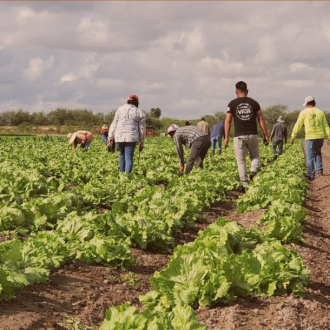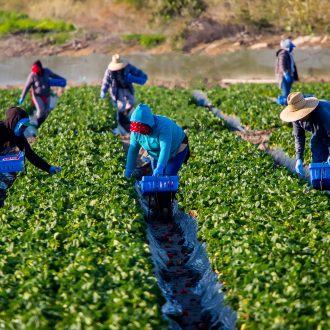California is by far the state with the largest number of farm workers in the U.S. who perform a variety of jobs on the state’s over 80,000 farms. Exact data for the number of farm workers living and working in California is almost impossible to find because of many factors such as the seasonality and migratory nature of farm work, the geographic distance between farm worker communities, and the large number of farms. However, several estimates from studies done in California put the number of farm workers in California at a range from about 400,000 to 1.1 million during certain parts of the year. (National Agricultural Workers Survey (NAWS), 2005; The Migrant and Seasonal Enumeration Study by the Bureau of Primary Care’s Migrant Health Program) About 20% of the total number of farm workers in California are employed consistently year round, while the rest only have seasonal work or are unsure whether they are employed year-round or seasonally. According to the most recent NAWS report for California, about 75% of all individual farm workers and 52% of all farm worker families made less than $15,000 a year in 2003-2004. Furthermore, 43% of all individual farm workers and 30% of all farm worker families made less than $10,000 a year.
In California in 2007, the market value of all crops produced on California farms was over $22 billion. (2007 Census of Agriculture)
The top 5 counties in California in which farm workers live and work are Fresno, Monterey, Kern, Tulare, and Ventura counties. (See map for location.) About 86% of farm workers are employed in fruit, nuts, and vegetable production.

When it comes to working in the fields, farm workers are extremely exploited. The United Farm Workers union has documented many stories of the lives of farm workers and some of the most inhumane treatment and conditions they labor under in California. Some of their most basic of needs that by law must be provided to them by their employers (clean and sufficient drinking water on the job, clean bathrooms, shade from the heat) are not. While their jobs in many cases do not provide health insurance, they are very susceptible to serious health problems because of exposure to pesticides. Farm worker women are often abused my their employers whether verbally or sexually. And the smallest of complaints about working conditions or behaviors even as simple as taking longer than the foreman thought they should in the bathroom can cause them to lose their job.
In California’s Central Valley during the harvest months of summer (May-August), farm workers must work in dangerously hot weather, with temperatures sometimes rising to over 100 degrees. They may work 10-12 hours a day. Very often farm workers are not provided with enough water, shade, or breaks during the work day and are thus very susceptible to heat stroke. Since 2004, 15 farm workers have died of heat-related illness in California. Last year alone, 6 farm workers died. In 2008, a short documentary, titled “California’s Harvest of Shame”, was made which documents this harsh reality for California’s farm workers. Narrated by Fabian Nuñez, former Speaker of the California State Assembly and son of a migrant farm worker himself, you can watch the video by clicking here.



